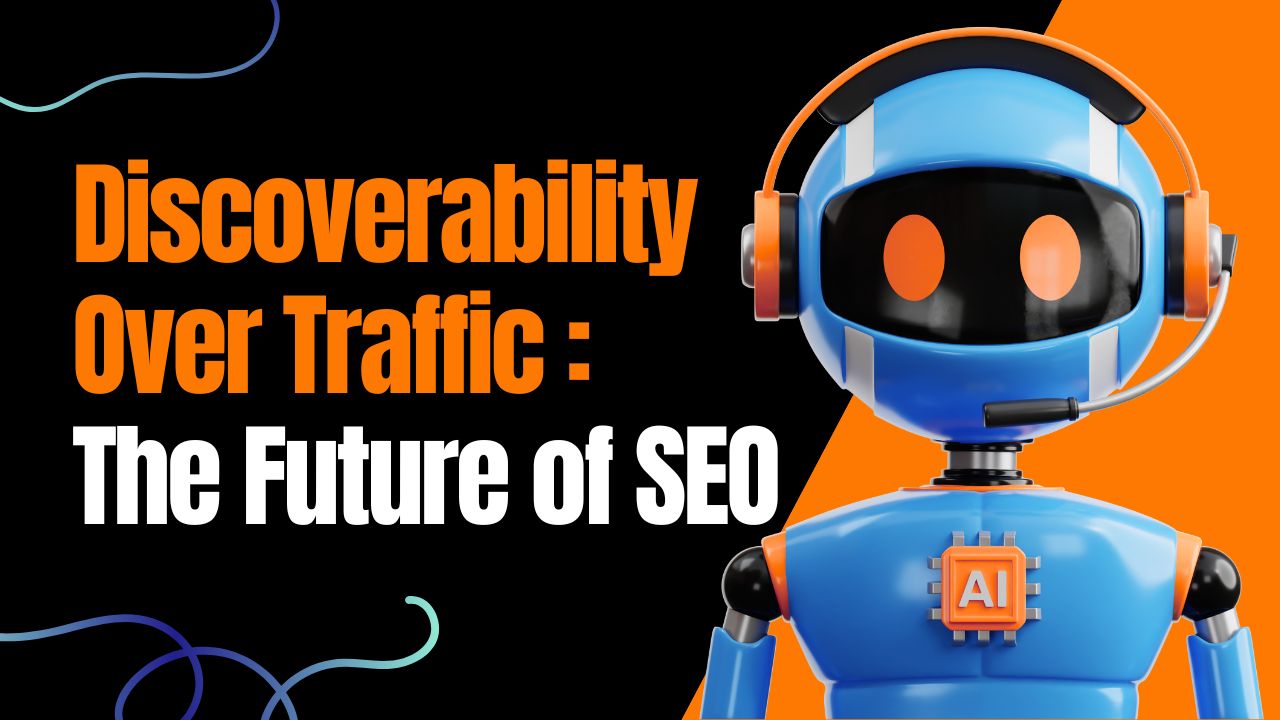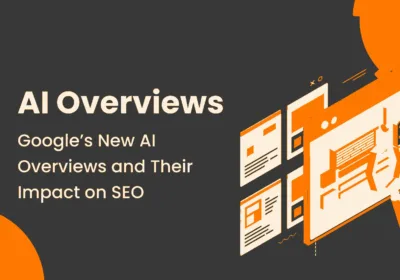Discoverability Over Traffic: The Future of SEO in an AI-Driven World

In 2025, the SEO landscape has transformed dramatically. With 60% of Google searches ending without a click (according to recent studies), traditional metrics like click-through rates (CTR) and rankings are no longer the sole indicators of success. Instead, discoverability—being visible across platforms, AI-driven search results, and social ecosystems—has become the cornerstone of modern SEO. This blog explores how Generative Engine Optimization (GEO) is redefining digital visibility and how brands can adapt to thrive in an AI-driven world.
What Is Discoverability in SEO?
Discoverability refers to how easily your content can be found and surfaced across diverse platforms, including search engines, AI-driven interfaces like Google’s AI Overviews, social media, and voice assistants. Unlike traditional SEO, which focused on driving clicks to a website, discoverability prioritizes impressions, mentions, and conversions—metrics that reflect visibility and engagement in a zero-click world.
Why Is Discoverability More Important Than Traffic?
- Zero-Click Searches: With AI-generated answers dominating search results, users often find information directly on the search engine results page (SERP) without clicking through.
- AI-Driven Interfaces: Tools like Google’s AI Overviews and social search platforms (e.g., X, YouTube) prioritize concise, authoritative answers over traditional links.
- User Behavior Shift: Modern users value instant answers and brand recognition over navigating multiple websites.
By optimizing for discoverability, brands can ensure their content appears in People Also Ask (PAA) boxes, featured snippets, and AI-generated responses, increasing visibility even without direct clicks.
How Does GEO Differ From Traditional SEO?
Generative Engine Optimization (GEO) is a strategy tailored for AI-driven search engines that generate answers by synthesizing information from multiple sources. Unlike traditional SEO, which focuses on keyword stuffing and link building, GEO emphasizes:
- Structured, Authoritative Content: Content must be clear, concise, and formatted for AI parsing (e.g., bullet points, tables, FAQs).
- Multi-Platform Optimization: Visibility across search engines, social media, and voice assistants.
- Semantic Relevance: Aligning content with user intent and contextual queries.
For example, to rank in Google’s PAA, content should directly answer common questions like “What is GEO in SEO?” or “How to optimize for zero-click searches?” using natural, conversational language.
How to Optimize for Discoverability in an AI-Driven World
To succeed in this new era, brands must adopt GEO strategies and focus on modern SEO metrics. Here’s how:
1. Optimize for People Also Ask (PAA) and Featured Snippets
Google’s PAA section is a goldmine for discoverability. To rank here:
- Answer Questions Directly: Use concise, factual answers in your content. For example, start paragraphs with question-based headings (e.g., “Why Are Zero-Click Searches Growing?”).
- Use Structured Formats: Incorporate bullet points, numbered lists, and tables to make content scannable for AI algorithms.
- Target Long-Tail Queries: Focus on specific, conversational queries like “How to measure SEO success without clicks.”
Example FAQ for PAA: What Are the Best Metrics for Modern SEO?
The best metrics include impressions (how often your content appears), mentions (brand references across platforms), and conversions (actions taken, like sign-ups or purchases). These reflect visibility and engagement in a zero-click world.
2. Leverage Multi-Platform Visibility
SEO is no longer just about Google. Optimize for:
- Social Search: Platforms like X and YouTube are increasingly used for search. Create shareable, engaging content (e.g., short videos, infographics) with hashtags like #SEO2025 or #ZeroClickSearch.
- Voice Search: Optimize for conversational queries (e.g., “What’s the future of SEO?”) by using natural language and schema markup.
- AI Interfaces: Ensure content is concise and authoritative to appear in AI-generated answers on tools like Grok or Google’s AI Overviews.
3. Focus on E-A-T (Expertise, Authoritativeness, Trustworthiness)
Google’s E-A-T framework is critical for ranking in AI-driven search. To demonstrate E-A-T:
- Showcase Expertise: Include author bios with credentials (e.g., “Written by Gyan Singh, SEO Consultant with 15+ years of experience”).
- Cite Authoritative Sources: Reference studies, industry reports, or data (e.g., “According to a 2024 SparkToro study, 60% of searches result in zero clicks.”).
- Build Trust: Use secure websites (HTTPS), transparent contact information, and user reviews to enhance credibility.
4. Track Modern SEO Metrics
Traditional metrics like CTR are outdated. Instead, measure:
- Impressions: Track how often your content appears in SERPs, social platforms, or AI responses.
- Mentions: Monitor brand references across blogs, forums, and social media using tools like Brand24 or Mention.
- Conversions: Focus on actions like newsletter sign-ups, downloads, or purchases, even if users don’t visit your site directly.
Table: Traditional vs. Modern SEO Metrics
| Metric | Traditional SEO | Modern SEO (GEO) |
|---|---|---|
| Focus | Clicks, Rankings | Impressions, Mentions |
| Goal | Website Traffic | Discoverability, Conversions |
| Tools | Google Analytics | Brand24, SEMrush, Google Search Console |
5. Create Content for AI Parsing
AI engines like Google’s AI Overviews favor structured, high-quality content. Tips include:
- Use Schema Markup: Implement FAQ or How-To schema to signal answers to search engines.
- Write Concise Answers: Keep responses under 60 words for PAA and snippet eligibility.
- Incorporate Visuals: Use infographics or charts to enhance engagement and shareability.
Why Are Zero-Click Searches Growing?
Zero-click searches are rising because:
- AI Overviews: Google’s AI-generated summaries provide instant answers on the SERP.
- User Expectations: Modern users want quick, reliable information without clicking through.
- Mobile and Voice Search: Over 50% of searches occur on mobile, where users prioritize speed (Statista, 2024).
To adapt, brands must optimize for recognition (being seen and mentioned) rather than just rankings.
Dig deeper:
- Zero-Click Searches Rising: How to Win SEO Without Ranking #1
- Google’s AI Overviews & SEO: What You Need to Know in 2025
- GEO vs. AEO vs. SEO: A Marketer’s Guide to 2025
- Top Digital Marketing Trends for 2025: What You Need to Know
How to Measure SEO Success Without Clicks
To gauge success in a zero-click world:
- Use Google Search Console: Track impressions and clickless interactions.
- Monitor Social Mentions: Tools like Hootsuite or Mention can quantify brand references.
- Analyze Conversion Paths: Use attribution models to track actions driven by impressions (e.g., Google Analytics 4).
Example: A brand appearing in a PAA box for “What is GEO in SEO?” may not drive clicks but can lead to newsletter sign-ups via increased visibility.
What Does the Future of SEO Look Like?
The future of SEO is about recognition over rankings. Key trends include:
- AI-Driven Search: Tools like Grok and Google’s AI Overviews will dominate, requiring GEO-focused strategies.
- Social Search Growth: Platforms like X are becoming search hubs, with 30% of Gen Z using social media for discovery (Forbes, 2024).
- Personalized Experiences: AI will tailor results to user context, emphasizing semantic optimization.
Conclusion: Adapt or Disappear
In an AI-driven world, SEO success hinges on discoverability, not just traffic. By embracing GEO, optimizing for PAA and snippets, and focusing on modern metrics like impressions and mentions, brands can stay visible and relevant. Start by auditing your content for E-A-T, leveraging multi-platform strategies, and tracking new KPIs to thrive in this evolving landscape.
Ready to boost your brand’s discoverability? Use tools like SEMrush or Google Search Console to track impressions and optimize for AI-driven search today.
About the Author: Gyan Singh is an SEO consultant with over a decade of experience, specializing in GEO and AI-driven strategies. He has helped brands like Kingsway achieve top rankings in PAA and featured snippets.



Leave a Reply